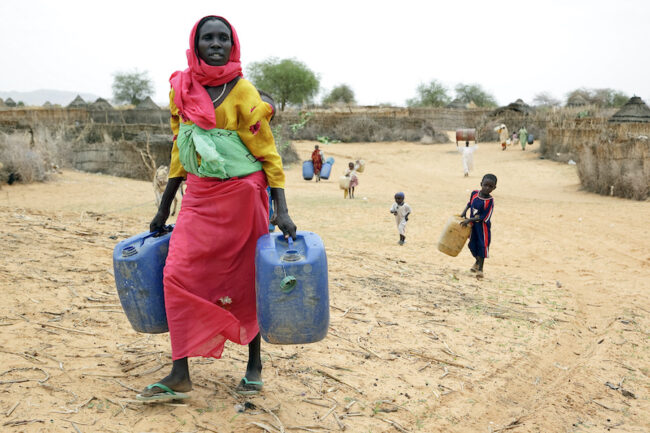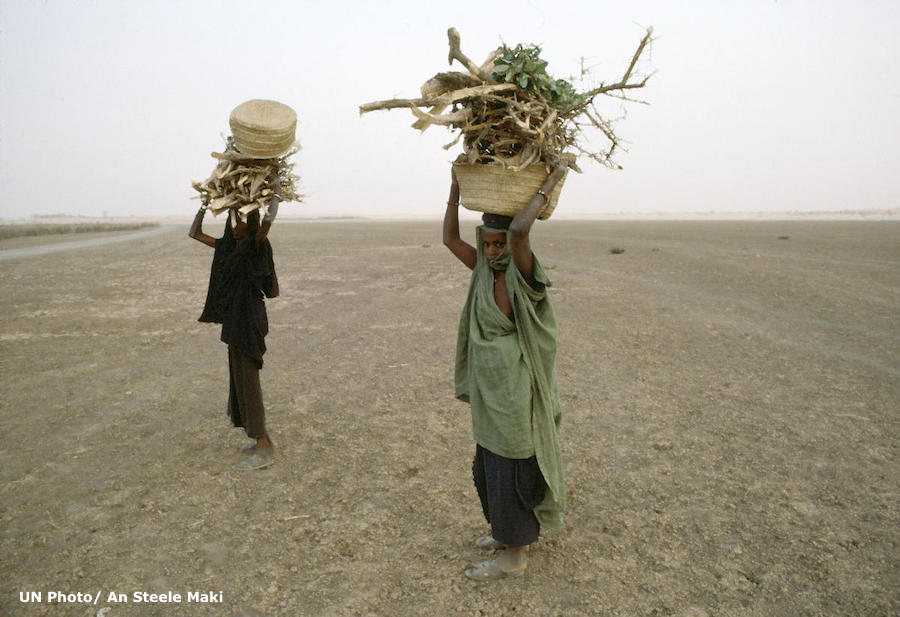Climate change impact on mothers and their unpaid care work
06.02.24
UN Geneva, Human Rights Council – Responding to a call for input into a report being prepared by the Office of the High Commissioner for Human Rights (OHCHR) on “Human rights and climate change”, MMM's submission focuses on the specific impact of climate change on women who are mothers, and on their ability to care for and educate their children. It also emphasises the multiple connections between climate change and women’s unpaid work of caring.

The following summarises the key points of our submission, which notably draws on the lived experiences of the people served by Friendship NGO, our grassroots member in Bangladesh.
Women are disproportionately affected by climate change, in particular in relation to unpaid care work
Like most crises, climate change exacerbates existing inequalities and vulnerabilities, in particular gender inequality. Because they are often confined to roles and jobs that make them more dependent on natural resources; because they face barriers to financial and technical support; because they are denied land ownership, women are also hindered in their adaptation to climate change and their ability to cope with a climate disaster.
The cascading consequences that climate change can have on the lives of women and their children include:
- Impact on livelihood and food security, increasing poverty risks, which disproportionately affects women who are engaged in subsistence farming or work in the food system
- Impact on access to clean freshwater because of salinisation or desertification, which forces women to walk longer distances, causing lost time and opportunities, or even forcing families to relocate altogether and restart a new life from scratch, leaving everything behind
- Impact on nutrition and health, not only for women, but also children and other members of the household. For children, malnutrition leads to stunting, with devastating effects on their physical, cognitive and emotional development
- Impact on unpaid care work: climate change increases the time women have to spend on family care work. The links between climate change and unpaid care work have been largely overlooked; but they are described in detail in a 2022 Oxfam report . This foundational work is mostly done by women, and is already a cause of economic injustice and hardship for them, especially when they are mothers. Climate change only makes matters worse.
The impact of climate change on food security, access to clean water, or on health, all increase the time and effort women put into unpaid care work. For example, climate change-induced desertification makes women walk longer distances to fetch water and cooking fuel. Rising temperatures effect children’s health, requiring mothers to do more care work. Recurring floods force mothers to flee with their children and to repair damages when water recedes – unpaid work again.

Climate change mitigation policies must be informed by time-use data
Women’s unpaid care work has regularly acted as a shock absorber for all sorts of threats and crises. It is no different with Climate change, which undermines any progress towards Gender Equality – at a great cost to society and the economy.
In the process of designing climate actions that are responsive and sensitive to gender, governments and other actors have focused primarily on women’s economic activities and overlooked how paid work and unpaid care work are intertwined.
Analysing the specific impact climate change has on time-use, in particular for unpaid domestic work, caring for children and dependent persons, subsistence farming, fetching water and cooking fuel – especially in underserved and vulnerable rural areas – could help measure the impact of slow-onset climate change-related events and design policies and programs to mitigate these negative impacts.
Transforming to a care society and a wellbeing economy
As the interconnections between gender equality, unpaid care work and climate change are becoming clearer, a number of countries, in particular in Latin America, are taking action.
As part of the 2023 Buenos Aires Commitments, they have undertaken to transform to a Care society, which is presented as an “alternative to the current development pattern, which places no value on essential life-sustaining activities, reproduces gender, socioeconomic, ethnic and territorial inequalities and has a deleterious socio-environmental impact. […] It is a proposal for organising society in such a way that the sustainability of life is the priority objective. To achieve this objective, it is essential to recognise the irreplaceable value of care for both people and the planet, and to distribute care provision on the basis of social and gender co-responsibility”.
The Care society has yet to become a reality, but the first steps are clear:
- Empowering women by addressing the inequitable distribution of unpaid care work
- Involving women in leadership and decision making at every level: policies, climate change mitigation and adaptation projects, and allocation of resources
- Harnessing women’s knowledge, skills and experience to adapt and innovate
- Transforming our economic system.
In order to transition to a Care society, our economic system must be transformed, so that it prioritises the sustainability of life and serves the well-being of all people and the planet in a just and sustainable manner – instead of prospering at their expense. While consensus is growing on the imperative of moving beyond GDP, it is now urgent to promote a Wellbeing Economy in service of life, and repurpose our economic system so that we recognise, value, and support the work of caring for each other and for the planet.
The New EU Gender Equality Roadmap : A Call for Inclusion of Mothers
04.03.25
The European Commission’s initiative on a new Gender Equality Roadmap post-2025, marks a significant step forward in addressing gender disparities across the European Union. Make Mothers Matter (MMM
Breaking the Cycle: Gender Equality as a Path to Better Mental Health
18.03.25
The Council of the European Union has taken a decisive step in recognising the vital connection between gender equality and mental health.
Europe Must Listen to Mothers: Our landmark report heads to the European Parliament
28.08.25
On 22 September 2025, the voices of mothers will take centre stage in Brussels. For the first time, Make Mothers Matter (MMM) will present its State of Motherhood in Europe








